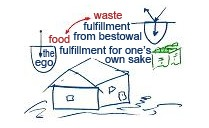Sukkot – Choosing to Be Under The Influence of Bestowal
"But on the fifteenth day of the seventh month, when you gather the produce of the land, you shall celebrate the festival of God for seven days: on the first day there shall be rest, and on the eighth day there shall be rest." – Torah, Leviticus, “Emor” 23:39
A holiday, a “good day” (Yom Tov) is receiving the Light that returns to the source, which gives us a screen for our desire to enjoy and makes us similar to the upper world, to the Creator, to bestowal. It is called a “day” because by means of this illumination, we can get the intention of bestowal, and the “good” is the reception of Light for the sake of bestowal.
Our egoistic nature is defined by our striving to receive for our sake, to fulfill ourselves. However, the good desire or inclination (Yetzer HaTov) is love and bestowal. These two opposing forces of reception and bestowal are revealed to me by the Light which I attract by studying Kabbalah and uniting with the friends.
On Shavuot, after the 9th of Av when we saw how shattered we are – as it symbolizes the shattering of the Tablets of the Ten Commandments – it also symbolized the partition of the tablets. Then we reach the recognition of evil in the Jewish New Year (Rosh Hashanah, the beginning of the new year), and we make a decision that we must be corrected. And then comes the Day of Atonement (Yom Kippur), which in Kabbalistic terms is described as the embrace of the right and the left line, as the revelation of the properties of the court, Dinim (judgment) and Hassadim (mercy), the sweetening.
Finally, there comes the festival of Sukkot, which stands for special corrections when I already can raise all my desires to bestowal.
The holiday of Sukkot symbolizes the construction of the anti-egoistic screen. We lived safely in our “permanent home,” in the desire to enjoy, and now we have to go out to a temporary dwelling, which is a symbol of going on a spiritual path. After all, there is nothing permanent in spirituality: we are constantly in a “temporary dwelling,” in constant changes, taking care of the cover, the screen, so as not to return to the “permanent home.”
The commandment, “Go out of the permanent housing and sit in temporary housing.” That is, know that it is only temporary housing, and “the outcast one will not be cast out from Him.” It is as was said, “Even if the whole world tells you that you are righteous, be wicked in your own eyes.” This is also the meaning of the words, “And you will be only glad.”
Baal HaSulam, Letter No. 51
My state of existence is regarded as “home” or a solid and reliable dwelling for egoism. Bestowal is regarded as a “temporary dwelling” or Sukkah. So, I choose in what property am I willing to exist: the egoistic home or the altruistic shelter.
There is fulfillment in both of them. In the former, I am fulfilled through receiving and in the latter through the act of bestowal. Hence, the key is what I view as sustenance and what I consider waste. I build my home from what I value the most.

This kind of discernment can be achieved solely by way of studying Kabbalah and through the group. Hence, it is written that the roof of the Sukkah is built from the “waste of barn and winery.” Wine represents the Light of Hochma (Wisdom), and the barn (bread) represents the Light of Hassadim (Mercy). The waste of the barn and winery are not important to us. But if I desire to bestow in order to become similar to the Creator, then they become more important to me than bread and wine.
We imagine ourselves as having to reach a new connection with the friends. This means that we come out of your permanent residence and we want to enter the temporary residence; that we want to build this small but new house, and we're looking for how we’ll embrace the friends in such a way that it will be a new form of connection, more advanced, holding us together tighter.
If we are able to live all the time in a temporary dwelling, that is, in changes, caring for the screen, rising above our desires and striving to become similar to bestowal, to the Creator, then we live as if floating in the air on an air cushion. The main thing is to take care that the bestowal is on top, that the Sukkah covering is above one’s head because it is a symbol of the screen. Therefore, on Sukkot it is accepted to eat only in the Sukkah.
This is why the festival of harvest [Sukkot] is called “the time of our joy,” to tell you that one should sit in the shade of a Sukkah in great joy, just as in the king’s house, the kingdom’s most eminent. “Sit” is as “dwell,” without any difference whatsoever.
And yet, he should know that he is sitting in the shade of a Sukkah, meaning the waste of barn and winery. However, “Under His shade I am delighted to sit,” since he hears His word, “Go out of the permanent housing and sit in temporary housing,” and both are words of the living God. Then his exit delights him as much as his entry.
Baal HaSulam, Letter No. 51
This article is a compilation of Rav Dr. Laitman's words from the following lessons:
https://kabbalahmedia.info/en/lessons/cu/wwvlTrIq?c=XZtRLRi0&mediaType=video
https://kabbalahmedia.info/en/lessons/cu/H21b5W7b?c=EJxiKGTT&mediaType=video